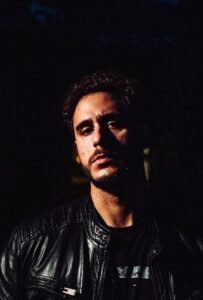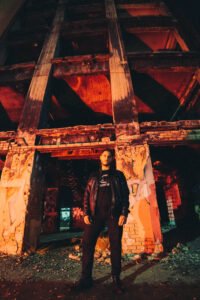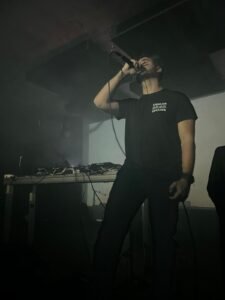Greek producer Alpha Sect hasn’t stopped surprising us since we bought his magnificent Dark Rituals a few years ago. His continuous evolution and his ability to reinterpret the classics have made him one of the electronic music producers to follow. This year he has once again released an EP on the Valencian label Soil Records in which he gives a new twist to his sound, adding an Italo touch that suited his music perfectly. He will be in charge of making us dance and think on the 6th of December at the Ombra Festival in Barcelona.
 —You started playing guitar in a post-rock band called Sleepstream. Do you think that this experience has influenced in your posterior work as Alpha Sect?
—You started playing guitar in a post-rock band called Sleepstream. Do you think that this experience has influenced in your posterior work as Alpha Sect?
—Yes, my experience with Sleepstream definitely shaped my approach to music. The atmospheric and expansive qualities of post-rock opened me up to more experimental ways of building sound and texture.
—When did you change your guitar for a synth? How was this move from post-rock to electronic music?
—The move from guitar to synth was gradual. I’ve always been drawn to electronic music, and over time, I felt like the possibilities with synthesizers were limitless compared to the guitar. It’s not so much abandoning one style for another, but evolving. Post-rock’s influence still lingers in the way I approach arrangement, melodies and dynamics, but the electronic music I make now allows for more precision and control over soundscapes.
—How has growing up in Greece marked your life? You said that you can’t avoid caring about politics in Greece. How was living in such a difficult period for your country?
—Greece has shaped me in so many ways, especially politically. I grew up during a time when the country was undergoing significant turmoil, with austerity measures and political unrest. The financial crisis really changed the atmosphere. It’s hard not to care when the world around you is shifting in such drastic ways. The struggle for survival, the fight for democracy, and the questioning of societal values are themes that often emerge in my work. In a way, the music becomes a way of coping, of questioning the status quo.
—A few years, ago we wrote an article about the documentary Music for Ordinary Life Machines. As you might know, it’s a doc about the Greek electronic music from the 80s and there you can find, among others, In Trance 95, another Greek band that is also going to play at Ombra. Were these bands an influence for you?
—Absolutely, I was familiar with the Music for Ordinary Life Machines documentary, and bands like In Trance 95 were a huge influence on me. Greece has such a rich history of underground electronic music, and artists like them laid the groundwork for the modern scene. I think I draw inspiration from that time and that spirit of experimentation—although I also try to make it my own. It’s important for me to keep pushing boundaries while respecting the foundations that came before.
—You released your first EP, Es Kommt Von Innen in 2020. Did you already have an idea of how you wanted to sound?
—When I released Es Kommt Von Innen, I had a very clear idea of what I wanted it to sound like. It was a personal reflection of what I was experiencing at the time, emotionally and politically. The idea of inner struggle and external chaos was central. But I also wanted it to be a statement of freedom—an exploration of the tension between personal liberation and the constraints of society.
—How was 2021 for Alpha Sect? You were quite active releasing a few EPs released during that year. Was a peak in your creativity or you just had more free time?
—2021 was a very productive year. The combination of more free time and an intense creative burst made it a peak period for me. It was a way to channel the energy of a very strange, isolated year into something tangible. I felt like there was so much to express—musically, emotionally, politically—and I had the time to fully explore these ideas.
—We first listened to your music thanks to the Soil album, Dark Rituals, based on religion. How do you get the concepts for your albums? Where do you look for inspiration?
—I draw inspiration from everything around me—life, history, politics, philosophy, and even personal experiences. Dark Rituals was inspired by religion, but my work is always evolving. I often look to controversial or sensitive topics because I think art has the power to question and provoke thought. Music, for me, is a way to invite people to think more critically about the world we live in.
—There, there was a remix by Sydney Valette, with whom you also collaborated in the song La “Liberté”. We also interviewed him a few years ago and saw him live a couple of times. Is he an artist that you like to collaborate with? Do you find points in common between his music and yours?
—Working with Sydney Valette was an enriching experience. We have similar aesthetic sensibilities—his approach to melody and rhythm resonates with me. He gave some pretty nice comments and directives about the track and it worked like a charm. When we collaborate, it feels natural because we both gravitate toward deeper, darker themes and electronic textures. It’s a symbiotic relationship, and I think our musical styles complement each other.
—”Resister pour Exister” is a really beautiful name for a song. Do you see it as a perfect “motto” for an independent musician?
—That song speaks to the independent spirit, for sure. It’s about resilience and standing your ground, especially as an artist. The independent music scene can often feel like an uphill battle, but “Resister pour Exister” is a reminder that resistance is part of what makes us who we are. Music is a powerful form of resistance, and it’s a message I hold close.
 —”Alexi Zeis” is one of your tracks based on the boy killed by the police in 2007. As you said before, you try with your music to invite people to think more critically. Do you think it works?
—”Alexi Zeis” is one of your tracks based on the boy killed by the police in 2007. As you said before, you try with your music to invite people to think more critically. Do you think it works?
—Yes, it can work. “Alexi Zeis” was inspired by the tragic events surrounding the death of a young boy in Greece in 2007, which had a huge impact on the country. For me, music can definitely be a vehicle for raising awareness or starting conversations, even about difficult topics. The idea is never to tell people what to think, but to give them the space to think critically.
—“La Liberté” was released as part of the Punks for Biologica Squat compilation. Do you think that you have a punk approach to music? Or life?
—I do identify with certain punk sensibilities—especially the DIY ethos and the desire to challenge norms. I think punk is about questioning authority, and in many ways, that’s the foundation of the music I create. Whether it’s through the way I compose or how I release music, there’s always an undercurrent of resistance.
—At the end of 2021 you released a few tracks with a higher BPM and a more 90s sounds like “Abundance of Lies”. Did you want to try something different, or you were just listening to this kind of music at the time?
—In 2021, I was listening to a lot of 90s techno and industrial music, so it felt natural to bring those influences into my own work. The higher BPMs and more rhythmic approach were inspired by that era, but also by a desire to explore new territory sonically. I don’t necessarily want to be confined to one sound—experimentation is key.
—Some of your tracks are very cinematic, would you like to do a soundtrack? For what genre?
—I would love to work on a soundtrack one day. My music has always been cinematic in nature, and I feel like the emotional and atmospheric quality could lend itself to film. If I had to choose a genre, I’d probably lean toward sci-fi or dystopian themes, as that’s where a lot of my imagination thrives.
—Somewhere I read that you are also active in physical theatre performances with a side project. Can you please tell us more about this?
—Yes, I’ve been involved in physical theatre, which has been a fascinating way to combine sound and movement. The live experience is different in that context—more visceral. It’s a way for me to expand beyond music and work with dancers and performers to create a more immersive experience. It’s an exploration of the body as an instrument of expression, which has taught me a lot about the relationship between sound and space.
—Your version of Bauhaus was our favorite of the Unknown Pleasures tribute. Why did you choose “Electrified”? Is post punk an influence in your music?
—”Electrified” by Bauhaus was a track I chose because it captured that perfect blend of post-punk and electronic experimentation. Post-punk has always been a huge influence on my work, particularly the way it blends dissonance with melody. Bauhaus’s ability to mix dark, atmospheric textures with driving rhythms really resonates with me.
—You did a rework of a track by Giorgio Moroder, was it difficult to approach such a classic artist?
—Reworking a classic like Giorgio Moroder was definitely a challenge, but also an honor. His influence on electronic music is undeniable. When I approached his work, I wanted to respect the original while adding my own twist. The key was maintaining the groove and energy while reinterpreting the sound for a new generation.
—You also collaborated in the Days of Sorrow remixes album, released by Banshee Records. How would you describe your approach to remixing? Do you prefer to remix something electronic or more rock like Days of Sorrow?
—When I approach remixing, I try to bring something new to the table. I enjoy remixing both electronic and rock-based tracks because both offer different challenges. With rock, it’s about transforming the energy of a band into something more electronic, while with electronic music, it’s about finding ways to bring new elements to something familiar. Remixing is an act of reinvention.
—Dance Mécanique was an EP about “a rebellion against the mechanization of our world”. Do you think that electronic music can help us to be more humans?
—I think electronic music can definitely help us reconnect with our humanity. The mechanical nature of machines can sometimes feel cold, but there’s an emotional depth in the way we use them to express ourselves. Dance Mécanique was a commentary on the tension between automation and the human spirit. If anything, it’s a call to remind us that technology should serve us, not dehumanize us.
—According to the bandcamp notes, La Naissance Des Morts was composed to be listening at home too. Do you find it more difficult to compose music for the club or for listening at home?
—Composing music for home listening versus the club is an interesting challenge. Home listening allows for more nuance and space, while club music has to be more immediate and energetic. Both have their own set of challenges, but I think my music works in both environments—whether it’s for personal reflection or for collective experience.
—What gear are you using in your last releases? Do you prefer digital or analogue?
—For my recent work, I’ve been using a mix of both digital and analogue gear. I think there’s a certain warmth and unpredictability in analogue that digital can’t fully replicate, but digital also gives me the precision I need. It’s all about finding a balance.
—Your last work, Fragmented Reality was released again in Valencian label Soil. One of the tracks “La última vez”, has a more italo disco vibe, is that a path that you would like to follow?
—La última vez definitely carries an Italo disco vibe, and I enjoy experimenting with that sound. I’m not sure if it’s a path I’ll fully follow, but I think it’s important to explore different genres. That’s what keeps the music fresh and exciting.
—What are your plans for the future with Alpha Sect?
—I’m always thinking ahead, but I’m also in the process of reflecting on where Alpha Sect has come from. I’m working on new material, exploring different genres, and pushing my creative boundaries. I don’t want to be boxed into any one sound, so expect more experimentation. I will also be introducing some Instagram live streams for my fellow hardware geeks, I am testing and preparing the setup for it, mostly showcasing jams and the creation process.
—What can we expect of your live at Ombra Festival?
—At Ombra, you can expect an intense, immersive performance. I want the live show to be an extension of the ideas and emotions behind the music. It will be a journey through sheer raw energy, sound and atmosphere, and I’m looking forward to sharing it with the audience.

